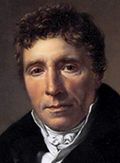 |
Emmanuel-Joseph Sieyès
b. 3 May 1748, Fréjus, Var [1]
d. 20 Jun 1836, Paris |
| Title: |
Président de la Convention nationale (President of the National Convention) |
| Term: |
20 Apr 1795 - 5 May 1795 |
| Chronology: |
20 Apr 1795,
elected, session of the National Convention, salle des Machines, Palais national des Tuileries, Paris [2][3] |
|
21 Apr 1795,
assumed the chair, session of the National Convention, salle des Machines, Palais national des Tuileries, Paris [4] |
|
5 May 1795,
ceased to exercise the functions of office upon the election of a successor [5] |
| Names/titles: |
Surname also spelled as: Siéyès; comte Sieyès, comte de l'Empire (count Sieyès, count of the Empire) [from 3 Jun 1808] |
|
Président de l'Assemblée nationale (President of the National Assembly) (8 Jun 1790 - 21 Jun 1790) [see details]; membre du Directoire exécutif de la République française (member of the Executive Directory of the French Republic) (20 May 1799 - 10 Nov 1799) [see details]; Président du Directoire exécutif de la République française (President of the Executive Directory of the French Republic) (19 Jun 1799 - 23 Sep 1799) [see details]; Consul de la République française (Consul of the French Republic) (10 Nov 1799 - 25 Dec 1799) [see details] |
| Biography: |
| Originated from a notary family of Fréjus; educated for an ecclesiastical career at the Doctrinaires' college in Draguignan; attended the seminaries of Saint-Sulpice (1765-1770) and Saint-Firmin (1770-1772) in Paris; was made a secretary to Jean-Baptiste-Joseph de Lubersac, bishop of Tréguier, Brittany (1775); accepted a canonry at Tréguier (1779); followed Lubersac who had been transferred to the bishopric of Chartres (1780); became a canon of the cathedral (1783) and chancellor of the diocese of Chartres (1788); appointed a commissioner at the Sovereign Chamber of Clergy of France (1787-1790); served as a member of provincial assembly of Orléans (1787); issued pamphlet Qu'est-ce que le tiers état? (1789), identifying the unprivileged Third Estate with the French nation; elected (19 May 1789) as a representative of the Third Estate by the constituency of Paris to the États-Généraux (Estates-General); was one of the initiators of declaring the Estates-General an assembly of representatives of the French people (15 Jun 1789); deputy of the Assemblée nationale (National Assembly) (1789-1791); served as President of the National Assembly (8 Jun 1790 - 21 Jun 1790); elected to Convention nationale (National Convention), representing the département of Sarthe (1792-1795); voted for the execution of King Louis XVI; served as a member of the Comité de salut public (Committee of Public Safety) (5 Mar 1795 - 3 Jul 1795, 2 Aug 1795 - 4 Nov 1795); elected President of the National Convention (20 Apr 1795 - 5 May 1795); elected (15 Oct 1795) to the Corps législatif by 19 départements, opted for Sarthe; selected for sitting in the Conseil des Cent-Cents (Council of Five Hundred); elected (1 Nov 1795) a member of the Directoire exécutif (Executive Directory), but declined (2 Nov 1795); survived an assassination attempt (12 Apr 1797); President of the Council of Five Hundred (21 Nov 1797 - 21 Dec 1797); appointed (10 May 1798) ambassador to the Kingdom of Prussia; elected a member of the Executive Directory for the second time (16 May 1799) to replace Jean-François Reubell; returned to Paris (7 Jun 1799) and assumed his seat (9 Jun 1799); served as President of the Directory (19 Jun 1799 - 23 Sep 1799); conspiring with Napoléon Bonaparte, helped organize the 18 Brumaire coup (9 Nov 1799 - 10 Nov 1799) that overthrew the Directory; appointed Consul of the Republic (10 Nov 1799 - 25 Dec 1799) along with Bonaparte and Pierre-Roger Ducos; drafted the Constitution of Year VIII; nominated member of the Sénat conservateur (ex officio as the outgoing consul according to Art. 24, Constitution of Year VIII, effective 25 Dec 1799); served as President of the Sénat conservateur (25 Dec 1799 - 25 Mar 1800); nominated grand officer of the Legion of Honour (14 Jun 1803), count of the empire (3 Jun 1808); nominated to the Chambre des pairs (Chamber of Peers) (2 Jun 1815) during the Cent-Jours (Hundred Days); banished as a regicide (1815) and did not return to France until 1830.
|
| Biographical sources: Dictionnaire des Conventionnels, 565-568;
Dictionnaire des parlementaires français 1789-1889, 5:316-318; "Sieyès et sa pensée", by Paul Bastid (Genève: Slatkine Reprints, 1978). |
| |
| [1] |
Sieyès was born and baptised 3 May 1748 according to his baptismal record preserved in the Archives of the Var département, register of baptisms, marriages and burials in the parish of Fréjus, 1747-1759, 7 E 65/3, f. 22 (digital copy). It was also published in "Sieyès et sa pensée", op. cit., p. 18: "L'an mil sept cent quarante-huit et le troisième du mois de mai, est né et a été baptisé par nous, vicaire soussigné, Emmanuel-Joseph Sieyès fils de Mr Honoré Sieyès et de Dlle Anne Anglès, mariés." |
| [2] |
Moniteur universel, No. 215, 5 Floréal, Year III (24 Apr 1795), p. 874. |
| [3] |
Immediately following his election as President of the National Convention, a letter from Sieyès was submitted to the presidency, declaring that he could not assume the office for various reasons; it was not either discussed or accepted and the next day Sieyès assumed the presidency. |
| [4] |
Moniteur universel, No. 215, 5 Floréal, Year III (24 Apr 1795), p. 875. |
| [5] |
Moniteur universel, No. 231, 21 Floréal, Year III (10 May 1795), p. 938. |
| |
Image: portrait by Jacques-Louis David. |

